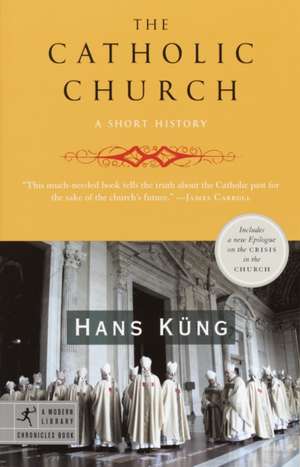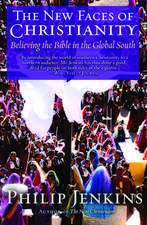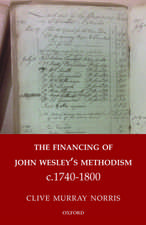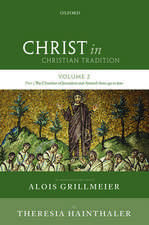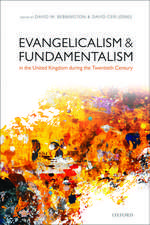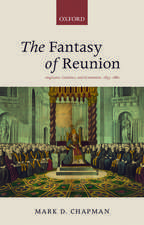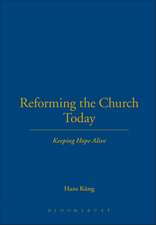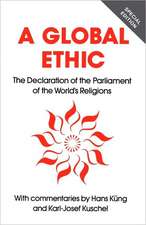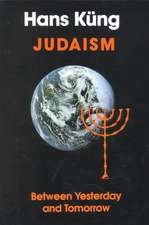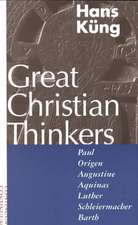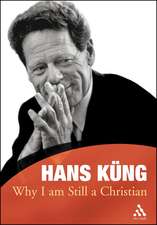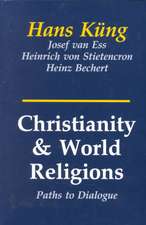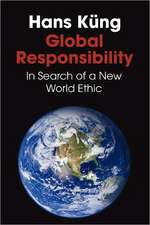The Catholic Church: A Short History: Modern Library Chronicles
Autor Hans Kungen Limba Engleză Paperback – 31 dec 2002
Din seria Modern Library Chronicles
-
 Preț: 125.06 lei
Preț: 125.06 lei -
 Preț: 94.47 lei
Preț: 94.47 lei -
 Preț: 88.68 lei
Preț: 88.68 lei -
 Preț: 88.86 lei
Preț: 88.86 lei -
 Preț: 119.77 lei
Preț: 119.77 lei -
 Preț: 94.66 lei
Preț: 94.66 lei -
 Preț: 120.59 lei
Preț: 120.59 lei -
 Preț: 113.97 lei
Preț: 113.97 lei -
 Preț: 98.34 lei
Preț: 98.34 lei -
 Preț: 103.09 lei
Preț: 103.09 lei -
 Preț: 144.04 lei
Preț: 144.04 lei -
 Preț: 122.45 lei
Preț: 122.45 lei -
 Preț: 110.47 lei
Preț: 110.47 lei -
 Preț: 105.19 lei
Preț: 105.19 lei -
 Preț: 115.75 lei
Preț: 115.75 lei -
 Preț: 117.35 lei
Preț: 117.35 lei -
 Preț: 96.67 lei
Preț: 96.67 lei -
 Preț: 109.24 lei
Preț: 109.24 lei -
 Preț: 101.71 lei
Preț: 101.71 lei -
 Preț: 96.46 lei
Preț: 96.46 lei
Preț: 112.52 lei
Nou
Puncte Express: 169
Preț estimativ în valută:
21.54€ • 23.40$ • 18.10£
21.54€ • 23.40$ • 18.10£
Carte disponibilă
Livrare economică 31 martie-14 aprilie
Preluare comenzi: 021 569.72.76
Specificații
ISBN-13: 9780812967623
ISBN-10: 0812967623
Pagini: 272
Dimensiuni: 132 x 203 x 13 mm
Greutate: 0.25 kg
Editura: Modern Library
Seria Modern Library Chronicles
ISBN-10: 0812967623
Pagini: 272
Dimensiuni: 132 x 203 x 13 mm
Greutate: 0.25 kg
Editura: Modern Library
Seria Modern Library Chronicles
Extras
As the author of The Catholic Church: A Short History, I want to say quite openly, right at the beginning, that despite all my experiences of how merciless the Roman system can be, the Catholic Church, this fellowship of believers, has remained my spiritual home to the present day.
That has consequences for this book. Of course, the history of the Catholic Church can also be told in a different way. A neutral description of it can be given by experts in religion or historians who are not personally involved in this history. Or it can be described by a hermeneutical philosopher or theologian, concerned with understanding, for whom to understand everything is also to forgive everything. However, I have written this history as someone who is involved in it. I can understand phenomena like intellectual repression and the Inquisition, the burning of witches, the persecution of Jews, and discrimination against women from the historical context, but that does not mean that I can therefore forgive them in any way. I write as one who takes the side of those who became victims or already in their time recognized and censured particular church practices as being un-Christian.
To be quite specific and quite personal, I write as one who was born into a Catholic family, in the little Swiss Catholic town of Sursee, and who went to school in the Catholic city of Lucerne.
I then lived for seven whole years in Rome in the elite papal Collegium Germanicum et Hungaricum and studied philosophy and theology at the Pontifical Gregorian University. When I was ordained priest I celebrated the Eucharist for the first time in St. Peter's and gave my first sermon to a congregation of Swiss Guards.
After gaining my doctorate in theology at the Institut Catholique in Paris, I worked for two years as a pastor in Lucerne. Then, in 1960, at the age of thirty-two, I became professor of Catholic theology at the University of Tiibingen.
I took part in the Second Vatican Council, between 1962 and 1965, as an expert nominated by John XXIII, taught in Tiibingen for two decades, and founded the Institute for Ecumenical Research, of which I was director.
In 1979 1 then had personal experience of the Inquisition under another pope. My permission to teach was withdrawn by the church, but nevertheless I retained my chair and my institute (which was separated from the Catholic faculty).
For two further decades I remained unswervingly faithful to my church in critical loyalty, and to the present day I have remained professor of ecumenical theology and a Catholic priest in good standing.
I affirm the papacy for the Catholic Church, but at the same time indefatigably call for a radical reform of it in accordance with the criterion of the gospel.
With a history and a Catholic past like this, should I not be capable of writing a history of the Catholic Church which is both committed and objective? Perhaps it could prove even more exciting to hear the story of this church from an insider who has been involved in such a way. Of course, I shall be just as concerned to be objective as any neutral person (if there really are such people in matters of religion). However, I am convinced that personal commitment and matter-of-fact objectivity can as well be combined in a history of the church as they can in the history of a nation.
From the Hardcover edition.
That has consequences for this book. Of course, the history of the Catholic Church can also be told in a different way. A neutral description of it can be given by experts in religion or historians who are not personally involved in this history. Or it can be described by a hermeneutical philosopher or theologian, concerned with understanding, for whom to understand everything is also to forgive everything. However, I have written this history as someone who is involved in it. I can understand phenomena like intellectual repression and the Inquisition, the burning of witches, the persecution of Jews, and discrimination against women from the historical context, but that does not mean that I can therefore forgive them in any way. I write as one who takes the side of those who became victims or already in their time recognized and censured particular church practices as being un-Christian.
To be quite specific and quite personal, I write as one who was born into a Catholic family, in the little Swiss Catholic town of Sursee, and who went to school in the Catholic city of Lucerne.
I then lived for seven whole years in Rome in the elite papal Collegium Germanicum et Hungaricum and studied philosophy and theology at the Pontifical Gregorian University. When I was ordained priest I celebrated the Eucharist for the first time in St. Peter's and gave my first sermon to a congregation of Swiss Guards.
After gaining my doctorate in theology at the Institut Catholique in Paris, I worked for two years as a pastor in Lucerne. Then, in 1960, at the age of thirty-two, I became professor of Catholic theology at the University of Tiibingen.
I took part in the Second Vatican Council, between 1962 and 1965, as an expert nominated by John XXIII, taught in Tiibingen for two decades, and founded the Institute for Ecumenical Research, of which I was director.
In 1979 1 then had personal experience of the Inquisition under another pope. My permission to teach was withdrawn by the church, but nevertheless I retained my chair and my institute (which was separated from the Catholic faculty).
For two further decades I remained unswervingly faithful to my church in critical loyalty, and to the present day I have remained professor of ecumenical theology and a Catholic priest in good standing.
I affirm the papacy for the Catholic Church, but at the same time indefatigably call for a radical reform of it in accordance with the criterion of the gospel.
With a history and a Catholic past like this, should I not be capable of writing a history of the Catholic Church which is both committed and objective? Perhaps it could prove even more exciting to hear the story of this church from an insider who has been involved in such a way. Of course, I shall be just as concerned to be objective as any neutral person (if there really are such people in matters of religion). However, I am convinced that personal commitment and matter-of-fact objectivity can as well be combined in a history of the church as they can in the history of a nation.
From the Hardcover edition.
Recenzii
“This much-needed book tells the truth about the Catholic past for the sake of the church’s future.” —James Carroll
“Hans Küng has done more to shape contemporary Catholic hope than anyone else, and with The Catholic Church he does it again.” —James Carroll, author of Constantine’s Sword
“One of the greatest theologians of the twentieth century, Hans Küng . . . is one of the world’s great mavericks. . . . Indeed, he was once called ‘the greatest threat to the Catholic Church since Martin Luther.’” —The Independent (London)
“A well-told, sweeping, and often incisive portrait.” —Kirkus Reviews
“Hans Küng has done more to shape contemporary Catholic hope than anyone else, and with The Catholic Church he does it again.” —James Carroll, author of Constantine’s Sword
“One of the greatest theologians of the twentieth century, Hans Küng . . . is one of the world’s great mavericks. . . . Indeed, he was once called ‘the greatest threat to the Catholic Church since Martin Luther.’” —The Independent (London)
“A well-told, sweeping, and often incisive portrait.” —Kirkus Reviews
Notă biografică
Hans Küng obtained a doctorate in theology from the Sorbonne in 1957. In 1962 he was named a theological consultant for the Second Vatican Council by Pope John XXIII, and he played a major role in the writing of the documents of Vatican II, which radically modernized key areas of Catholic teaching. The author of many books, he lives and teaches in Tübingen, Germany.
Descriere
In this extraordinary book, the controversial and profoundly influential Hans Kung chronicles the Roman Catholic Church's role as a world power throughout history. Along the way, he examines the great schisms--between east and west, Catholic and Protestant--the evolving role of the papacy, the stories of the great reforming popes, and the expansion of a global church infrastructure.
